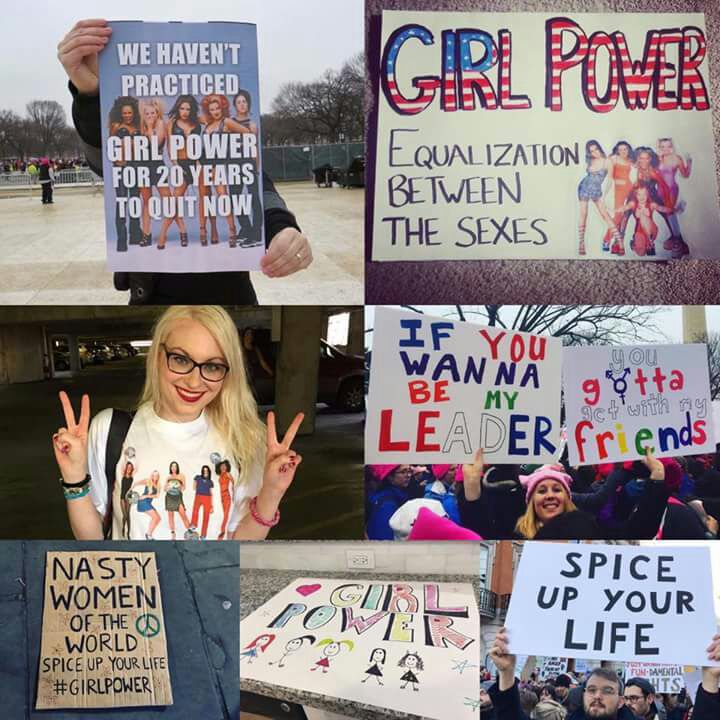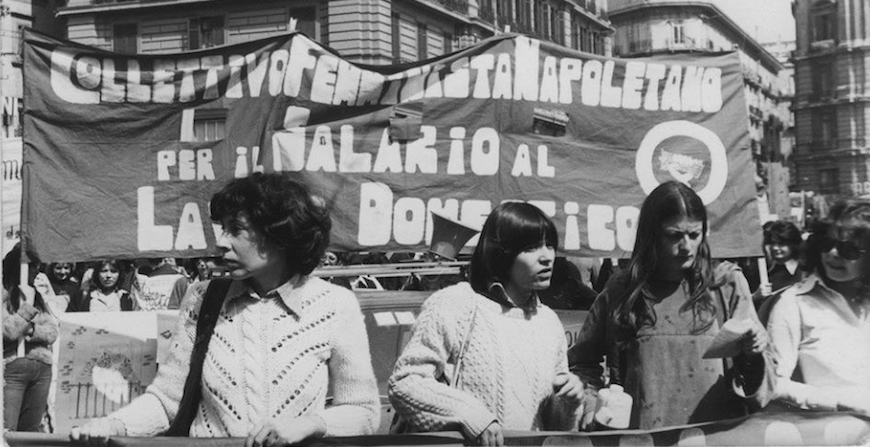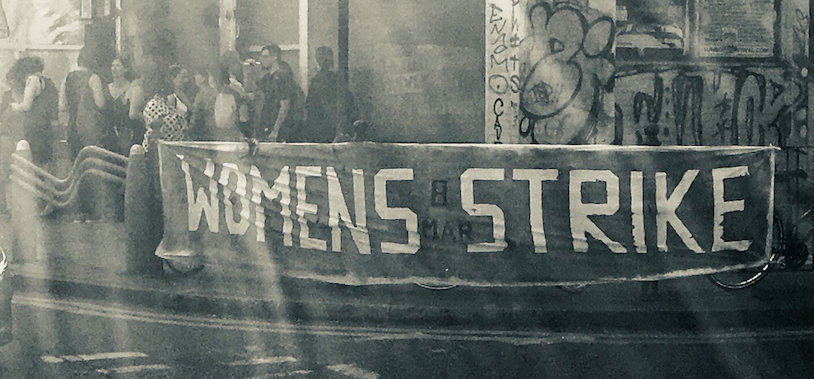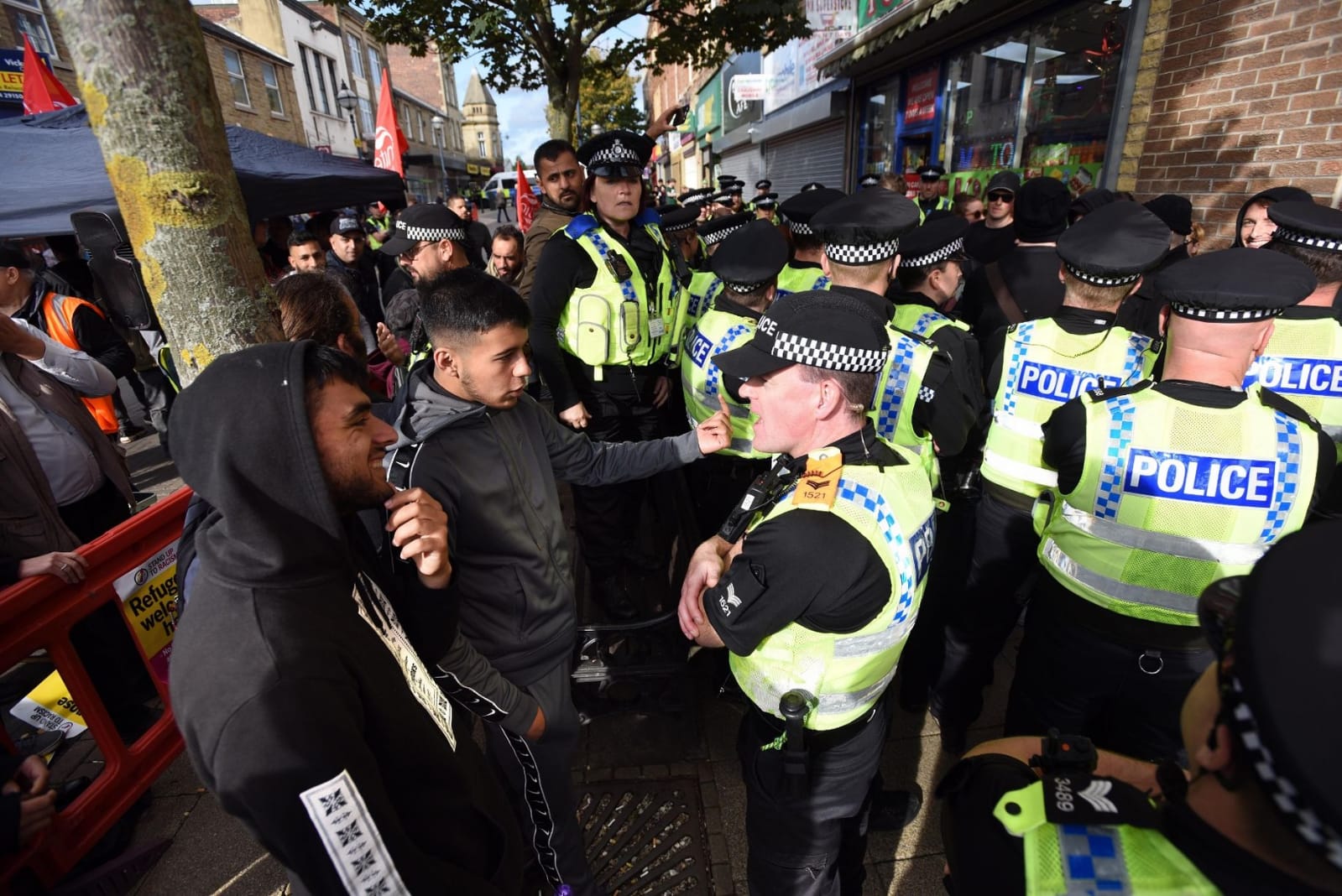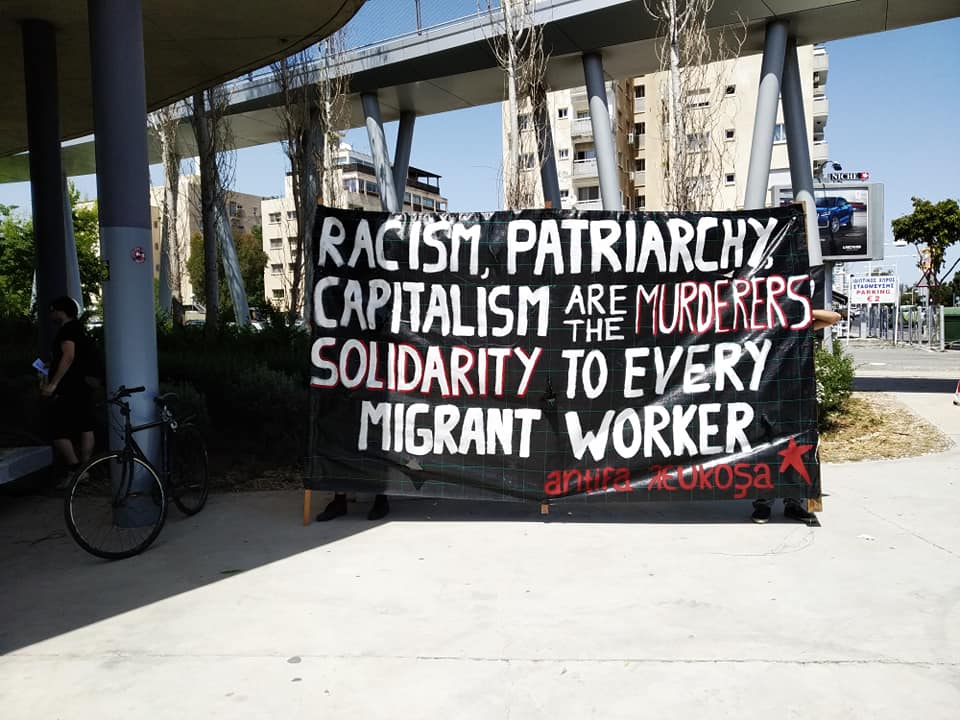Rosa Campbell shares with us her reflections on the Women’s Marches around the globe.
Right now history is being made quickly. Just over a week has passed since the women’s march and things are changing fast. Trump has banned Muslims from entering the US, deliberately failed to mention the Jewish, communist, gay and lesbian and Roma victims of the Holocaust as part of the Holocaust memorial day address. The most sterile of social spaces, the airport, has become a site of protest: lively and warm. Snap demonstrations, such as the one in London, called to protest Trump’s Muslim ban and the UK’s complicity in it, brought thousands of people on the street. The women’s march seems a long time ago, and talking about a little fragment of it, namely the presence of the Spice Girls at the London Women’s march, might seem overly committed to ephemera. But I think fragments can illuminate things more broadly, and I am in good company here. Fragments are often lost, too, when things are moving as fast as they are right now and then have to be retrieved by painfully combing the archives later.
Significant ink has been cleverly spilled discussing the meanings of the Women’s March, both what it meant externally, outside of the feminist movement. For example, that it was the biggest day of protest in US history, that is was an international event, that three times more people came to this demonstration than Trump’s inauguration. As well, there has been interesting discussion about what the march represented, internally, to the feminist movement; or rather who was represented at the march and what that said about the feminist movement. There has been criticism that it was very white and liberal, that white women did not acknowledge their own power and the benefits they receive now and have historically received from white supremacy, that the Washington march excluded trans women, but that, despite all this, we should challenge ourselves to ‘be part of something that isn’t perfect, that doesn’t articulate our values the way [we] do.’
Of course the internal and external meanings are imbricated with one another, and the dichotomy is false, particularly for the feminist movement. The internal debates resonate and reverberate within the debates of the Second Wave feminist movement, sometimes becoming the external story of the march. The ‘infighting’ and ‘bickering’ as the media called it, was one of the first things they wanted to talk to Washington organisers about. And because of this self-reflexive debate occurring within the organising committee, it was suggested the women’s march was becoming a joke. Calling self-reflexive debate – which I would suggest is not present the same way in other social movements- ‘bickering’ denies its power. Bickering and infighting, unlike debate, do not have transformative potential. So calling debate bickering means feminism will always and already be too liberal, always and already be unrepresentative, will always and already be racist. This is despite the real politic that lots of women and non-binary people of colour are giving generously out to white feminists, who do sometimes take it up. This is despite the gains feminism has made, and despite the revolutionary potential for transformative social change and change in subjectivity offered by anti-capitalist, anti-racist feminism. This self-fulfilling prophecy has an affective quality too, meaning it creates particular feelings in people and actively generates emotions, in this case it creates exhaustion and it creates despair.
So I want to strike against exhaustion and against despair by talking about the Spice Girls. I went to the London march accompanied by Sporty, Baby, Posh, Scary and Ginger, in lots of ways, on jumpers, posters and referenced in slogans. You could easily dismiss the Spice Girls as too liberal and you could stop reading now.
Then when you saw me next we could chat like this:
Me: Oh I saw loads of Spice Girls posters and jumpers at the London demo!
You: I know I read that super liberal and soft article you wrote. Or like, I read half of it.
Me: 🙃🙃🙃
But that, at this moment, would be to use our politics ‘as a theory of the obvious.’ We ask the question eg. ‘What the fuck are the spice girls doing at the women’s march?’ And we give the same old answer, shoring it up. ‘The question delivers no new knowledge, only the answer we already knew. It’s a kind of game, political theory as Trivial Pursuit. In fact, the reason we need to ask the question is because we really don’t know.’
This is to deny all our complexity, our potential for change, the particularity of our political moment. I’m not saying that we can’t know. But that we should try, because right now the old answers and old games don’t make sense to me.
So, to lean towards knowledge, there are two things I want to say, one is political and one is aesthetic and they both discuss two different manifestations of spice on the march.
A word about aesthetics (You wanna get with me, you better listen carefully)
The first time I saw the fab five, they were being held on a poster, by a young woman whose friend was holding a sign saying ‘Support your sisters, not your cis-ters.’ The sign was home made and had the trans liberation colours stuck on. They were sixteen, had linked arms and they were singing Wannabe. My badass feminist philosopher friend was also on the march and also participating in a singalong of Wannabe at the very same time, with a different crew.
In these two moments in the women’s march, the aesthetics were significantly enmeshed with the political to create a pre-figurative moment. There was glitter, laughter and dancing, there were non-ugly leaflets and women celebrating friendship and love and being actively non-competitive with other women and non-binary people, caring for rather than competing with them, while they took the streets, being powerful to the tune of zig-a-zig-ah!
Sometimes prefigurative aesthetics isn’t the Big Flame archive, or the See Red women’s workshop, or the picture of Jayaben Desai by your mirror that you say hello to every morning to keep yourself strong at a posh university where you mostly feel out of place (just me then, eh!). Not everyone knows the ins and outs of the Grunwick strike, or butch/femme history, or the beautiful work that is and was being printed by DIY feminist printing presses. For some people, The Spice Girls is that. In this moment the Spice Girls were unhooked from their previous incarnations, split from Thatcher and neo-liberalism, through politics and aesthetic irony, to mobilise the radical potential of Girl Power.
A word about politics. (Tell me what you want, what you really really want)
Then there was another poster, which said ‘The spice girls did not break up for this.’ I wondered for some time afterwards, what ‘this’ was. And what ‘this’ is, is the Trump agenda and the way it has thrown your breakfast eggs against the wall, the table on the roof and torn the pages out of your copy of It’s the Economy Stupid and used them as a pooper scooper for a small fluffy dog.
But it’s not really funny. What this sign says is, ‘please lets everything be back to normal,’ let’s return to a time before ‘this’ madness! The time before this, was the time when we were told all political decisions were being made to avoid economic crisis. Where we were encouraged to use the economy as an excuse to justify the UK’s inhumanity towards refugees and migrants and be blind to UK border regime, to endless cuts, to endemic poverty. The time before this, was when (thought) we knew what was going on and what was going to happen. The affect generated here was security. It was a time where we could turn, were encouraged to turn a blind eye to those who didn’t, whose lives were in huge, long term and significant crisis, who didn’t know what was happening, whether they’d be able to cross the next border, when they’d next be able to see their families, whether they’d get their next benefit. This sign is the spice girls equivalent of wearing an EU flag cape.
We can’t go back though- whether Geri left the group or not- can we, because our response to this moment has the potential to open many more eyes to what has been happening all along. This is not ‘business as usual’; but let’s not pretend that it ever was. We need to let the pre-figurative political moments in, and be enlivened by the radicalism of people. We can be excited that the form radical politics takes doesn’t fit the same old tick sheet (as if it ever did). We don’t know what will happen next, but may it Spice up all our lives. Everyone gets to be in our super group that will take the world by storm. And critically, crucially, no one gets left out.

